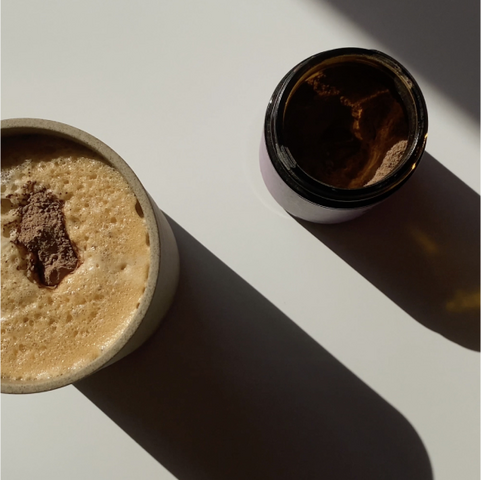Magnesium is a powerhouse mineral that plays a role in every body function, from synthesizing proteins to maintaining proper nerve and muscle function.
But while it’s essential, most people don’t get enough Magnesium through their diet.
Low intake of Magnesium can show up as muscle cramps, sleep issues, painful periods, mood changes, low bone density, brain fog, fatigue, high blood pressure, poor blood sugar control, headaches, and other health conditions.
Addressing common culprits of Magnesium deficiency like digestive disorders, diet, and stress can help prevent low levels.
Below, we cover how to raise Magnesium levels so your body has what it needs to function optimally.
1. Eat Magnesium-Rich Foods
If you’re wondering how to increase Magnesium intake, addressing your diet is a good place to start.
Making sure your diet includes a variety of whole foods ensures your body has what it needs to thrive, including Magnesium.
The following foods are rich in Magnesium:
- Nuts and seeds like pumpkin seeds, peanuts, and cashews
- Beans
- Leafy greens like spinach and chard
- Potatoes
- Oatmeal
- Bananas
- Brown rice
- Salmon
In some cases, medical treatment may be necessary to address an underlying cause, including conditions that affect nutrient absorption and certain medications. If you’re experiencing lingering signs of a Magnesium deficiency, consider speaking with a health professional about testing.
2. Take Magnesium Supplements
Ideally, you’d get most of your dietary Magnesium through the foods you eat alone. But that’s not always possible.
Eating a perfect blend of nutrients can be challenging — especially since your needs can vary from day to day and throughout your life. Modern agricultural practices, like monocropping and pesticide use, have also affected the nutrient profiles of many foods, making them less nutrient-dense over time.
A deficiency might also require a higher intake than you can get through food to replenish your stores and rebalance low Magnesium levels.
So, how do you raise Magnesium levels in the body when your diet can’t keep up?
Enter: Magnesium dietary supplements.
A Magnesium powder supplement can help fill in the gaps where you might be missing out on the essential nutrient.
Magnesi-Om® contains 3 bioavailable types of Magnesium plus L-Theanine to help restore cellular balance for relaxation, sleep, brain health, and regularity.*
3. Reduce Factors That Lower Magnesium
Lifestyle factors can impact your body’s ability to properly absorb and use dietary Magnesium — whether you’re getting it through food or supplements. Excess alcohol, caffeine, and sugar intake can all block your body’s ability to access Magnesium and put it to use.
Alcohol
Too much alcohol can negatively impact your digestive health, harming the lining of your digestive tract and increasing gut inflammation, making it harder for your body to absorb not just Magnesium but many other nutrients it needs to function.
Caffeine
Drinking coffee has some research-backed health benefits. Some studies suggest that polyphenols in coffee may have antioxidant effects. There’s also evidence that drinking coffee may help with blood sugar regulation.
But the same compounds that can benefit your overall health, can also impact Magnesium absorption.
Polyphenols may bind with Magnesium, making it harder for the body to absorb and use the Magnesium you take in.
That doesn’t mean you need to stop drinking your favorite caffeinated beverages to maintain a healthy Magnesium level. Instead, consider spacing out your AM cup of Java so you’re not taking it alongside your go-to Magnesium supplement.
Excess Sugar
There’s evidence that high sugar levels can lead to excess inflammation in the body. This chronic inflammation can impact gut health and make it harder for your body to absorb nutrients.
High blood sugar can also cause your kidneys to excrete more Magnesium than usual, causing a depletion over time.
Chronic high blood sugar can also lead to insulin resistance and diabetes. Because insulin is crucial for Magnesium cell uptake, imbalances can affect how much Magnesium is available for use by the body.
4. Enhance Absorption
If your body is poorly absorbing Magnesium, taking in more Magnesium-rich foods and supplements may not be enough to top up your stores.
Here are a few ways to increase Magnesium absorption in your body:
Balance Your Calcium and Magnesium Intake
Taking in the right ratio of Calcium and Magnesium ensures your body can properly absorb these minerals.
There’s some debate on the ideal balance, but most experts suggest about a 1:1 or 2:1 Calcium-to-magnesium ratio.
Generally, most adults should aim to take between 1,000 and 1,300 milligrams (mg) of Calcium daily. For Magnesium, the recommendation for adults is between 360 and 420 mg, depending on whether a person is male, female, pregnant, or over 50. It’s highly recommended to take a Magnesium supplement daily if you have low levels of this essential nutrient.
Get Plenty of Vitamin D
If you’re experiencing a Magnesium deficiency, it may be important to address your Vitamin D intake.
Vitamin D & Magnesium have an important relationship. Here’s how:
- Vitamin D is crucial for supporting gut health, particularly your gut lining.
- Vitamin D helps limit inflammation that can impact Magnesium absorption.
- Vitamin D also plays a role in blood sugar regulation.
You can get Vitamin D through food sources and exposure to sunlight. Careful, though. Excess Vitamin D intake can also impact Magnesium absorption.
Eat Foods High in B6
Vitamin B6 plays a role in healthy metabolism by aiding in the breakdown of carbohydrates, fats, and proteins. Older research shows it helps your body metabolize Magnesium — which is why many Magnesium supplements also contain B6.
Foods high in B6 include:
- Fatty fish like tuna and salmon
- Chickpeas
- Dark leafy greens
- Bananas
- Oranges
- Chicken
Be Mindful When Eating Whole Grains
Whole grains, seeds, and nuts contain phytic acid, a substance that can reduce Magnesium absorption.
Make them part of your healthy diet by avoiding eating them at the same time you take a Magnesium supplement.
You can also try soaking or sprouting these foods to reduce their phytic acid levels.
Stay Hydrated
Dehydration can cause low Magnesium levels in your body and show up as brain fog and fatigue. Maintaining optimal hydration throughout the day helps balance out electrolyte levels like Magnesium.

5. Manage your stress levels
Stress is problematic in so many ways. Chronic high-stress levels can even impact your body’s Magnesium levels.
Some stressors, including physiological and mental stress, may negatively impact Magnesium blood levels, making it harder for your body to manage daily stress — and messing with your body’s ability to absorb essential nutrients like Magnesium.
You can manage your stress levels and ensure your body is primed to properly absorb Magnesium with the following research-backed stress-coping strategies:
- Getting enough sleep
- Engaging in mindfulness strategies like meditation or yoga
- Exercising regularly
- Getting outside and enjoying nature
- Building social bonds
- Journaling
6. Cook With Herbs & Spices With Magnesium
Did you know that spices and herbs are an easy way to increase Magnesium intake?
Herbs, like cilantro, basil, parsley, dill, and cumin, contain small to modest amounts of Magnesium, which can help increase your intake of this vital mineral.
Use fresh or dried herbs to give your food a flavor and nutrient boost.
Here are a few ideas for spicing your food up with Magnesium:
- Add fresh herbs like parsley, basil, or cilantro to your next smoothie.
- Chop up a variety of fresh herbs and mix with cooked quinoa and nuts for a nutritious, fresh-tasting lunch.
- Mix your favorite dried herbs with salt and pepper to create a tasty spice rub for roasting hearty root vegetables.
- Use micro-herbs as a topper for soups and sandwiches.
Bottom Line
Your body needs Magnesium for optimal health. While nourishing your body with Magnesium-rich foods is one way to boost stores of this vital electrolyte, it’s not always easy to meet nutrient needs on a daily basis.
Other strategies for boosting Magnesium levels include taking a Magnesium supplement, limiting consumption of alcohol, sugar, and caffeine, increasing your intake of B6, timing your Magnesium intake appropriately, managing your stress levels, and cooking with herbs and spices high in Magnesium.
Incorporating these tips into your routine will allow you to stay on top of your body’s Magnesium needs and experience the benefits of Magnesium. If you’re looking for a high-quality dietary magnesium supplement to take on a daily basis, try Magnesi-Om®.
Sources
- Abbasi B, et al. (2012). The effect of magnesium supplementation on primary insomnia in elderly: A double blind placebo-controlled clinical trial. https://www.ncbi.nlm.nih.gov/pmc/articles/PMC3703169/
- Akimbekov NS, et al. (2020). Vitamin D and the host-gut microbiome: A brief overview. https://www.ncbi.nlm.nih.gov/pmc/articles/PMC7322162/
- Are anti-nutrients harmful? (2022). https://www.hsph.harvard.edu/nutritionsource/anti-nutrients/
- Bander ZA, et al. (2020). The gut microbiota and inflammation: An overview. https://www.ncbi.nlm.nih.gov/pmc/articles/PMC7589951/
- Barbagallo M, et al. (2015). Magnesium and type 2 diabetes. https://www.ncbi.nlm.nih.gov/pmc/articles/PMC4549665/
- Basil, fresh. (2019). https://fdc.nal.usda.gov/fdc-app.html#/food-details/172232/nutrients
- Bishenhsari F, et al. (2017). Alcohol and gut-derived inflammation. https://www.ncbi.nlm.nih.gov/pmc/articles/PMC5513683/
- Bode C, et al. (1997). Alcohol’s role in gastrointestinal tract disorders. https://www.ncbi.nlm.nih.gov/pmc/articles/PMC6826790
- Boomsma D. (2008). The magic of magnesium. https://pubmed.ncbi.nlm.nih.gov/23969766/
- Boyle NB, et al. (2017). The effects of magnesium supplementation on subjective anxiety and stress—A systematic review. https://www.mdpi.com/2072-6643/9/5/429
- Calcium. (2023). https://ods.od.nih.gov/factsheets/Calcium-Consumer
- Cilantro, raw. (2018). https://fdc.nal.usda.gov/fdc-app.html#/food-details/1103350/nutrients
- Costello RB, et al. (2021). Perspective: Characterization of dietary supplements containing calcium and magnesium and their respective ratio–Is a rising ratio a cause for concern? https://pubmed.ncbi.nlm.nih.gov/33367519
- Cumin seed. (2019). https://fdc.nal.usda.gov/fdc-app.html#/food-details/170923/nutrients
- DeLuccia R, et al. (2019). Calcium to Magnesium ratio higher than optimal across age groups. https://www.ncbi.nlm.nih.gov/pmc/articles/PMC6574898/
- Dill weed, fresh. (2019). https://fdc.nal.usda.gov/fdc-app.html#/food-details/172233/nutrients
- Durlach J, et al. (2002). Biorythms and possible central regulation of magnesium status, phototherapy, darkness therapy and chronopathological forms of magnesium depletion. https://pubmed.ncbi.nlm.nih.gov/12030424/
- Eisinger J, et al. (1986). Vitamin B6 and magnesium. https://europepmc.org/article/med/3959594
- Hatzistavri LS, et al. (2009). Oral magnesium supplementation reduces ambulatory blood pressure in patients with mild hypertension. https://pubmed.ncbi.nlm.nih.gov/19617879/
- Jin S, et al. (2020). The association of dietary flavonoids, magnesium and their interactions with the metabolic syndrome in Chinese adults: A prospective cohort study. https://www.cambridge.org/core/journals/british-journal-of-nutrition/article/association-of-dietary-flavonoids-magnesium-and-their-interactions-with-the-metabolic-syndrome-in-chinese-adults-a-prospective-cohort-study/29A50A1AFE728EBE66B9322226B5DA7B
- Kirkland AE, et al. (2018). The role of magnesium in neurological disorders. https://www.ncbi.nlm.nih.gov/pmc/articles/PMC6024559/
- Ma X, et al. (2022). Excessive intake of sugar: An accomplice of inflammation. https://www.ncbi.nlm.nih.gov/pmc/articles/PMC9471313
- Magnesium. (n.d.). https://www.hsph.harvard.edu/nutritionsource/magnesium
- Magnesium. (2022). https://ods.od.nih.gov/factsheets/Magnesium-HealthProfessional/
- Magnesium. (2023). https://www.ncbi.nlm.nih.gov/books/NBK519036/
- Magnesium and stress. (n.d.). https://www.ncbi.nlm.nih.gov/books/NBK507250/
- Maier JAM, et al. (2023). Magnesium and the brain: A focus on neuroinflammation and neurodegeneration. https://www.mdpi.com/1422-0067/24/1/223
- Mousa A, et al. (2016). Effect of vitamin D supplementation on inflammation: Protocol for a systematic review. https://www.ncbi.nlm.nih.gov/pmc/articles/PMC10251798
- Möykkynen T, et al. (2001). Magnesium potentiation of the function of native and recombinant GABA(A) receptors. https://pubmed.ncbi.nlm.nih.gov/11447329/
- Murck H. (2002). Magnesium and affective disorders. https://pubmed.ncbi.nlm.nih.gov/12509067/
- Nuss P. (2015). Anxiety disorders and GABA neurotransmission: A disturbance of modulation. https://www.ncbi.nlm.nih.gov/pmc/articles/PMC4303399/
- Pallauf J, et al. (1998). Dietary phytate reduces magnesium bioavailability in growing rats. https://www.sciencedirect.com/science/article/abs/pii/S0271531798000852
- Parsley, fresh. (2019). https://fdc.nal.usda.gov/fdc-app.html#/food-details/170416/nutrients
- Pham H, et al. (2023). The effect of vitamin D supplementation on the gut microbiome in older Australians–Results from analyses of the D-Health trial. https://www.ncbi.nlm.nih.gov/pmc/articles/PMC10251798
- Physiology, NMDA receptor. (2022). https://www.ncbi.nlm.nih.gov/books/NBK519495
- Rad EY, et al. (2014). The effects of vitamin D supplementation on glucose control and insulin resistance in patients with diabetes type 2: A randomized clinical trial study. https://www.ncbi.nlm.nih.gov/pmc/articles/PMC4499086
- Zhou Y, et al. (2014). Glutamate as a neurotransmitter in the healthy brain. https://www.ncbi.nlm.nih.gov/pmc/articles/PMC4133642/














